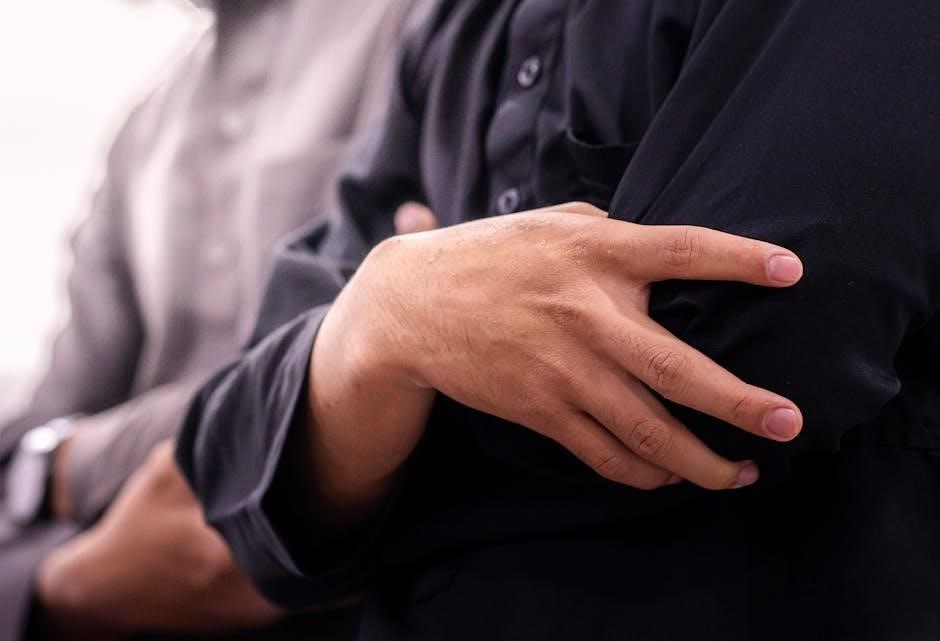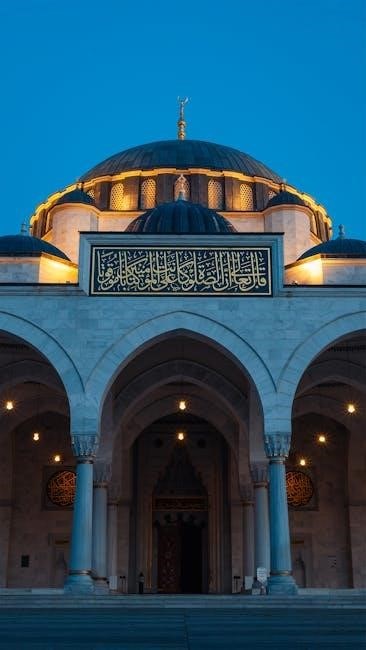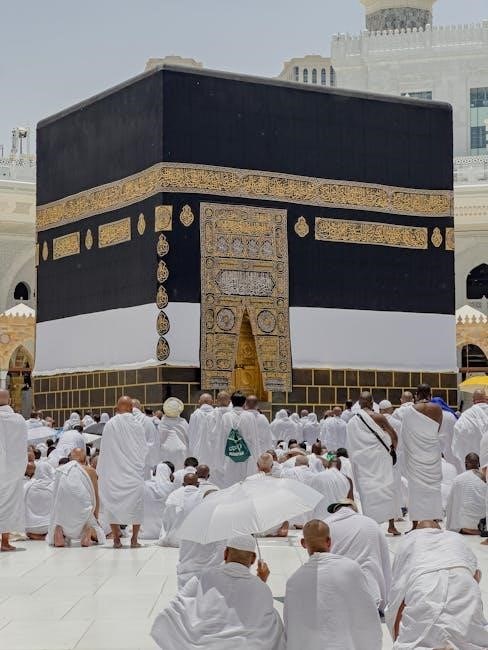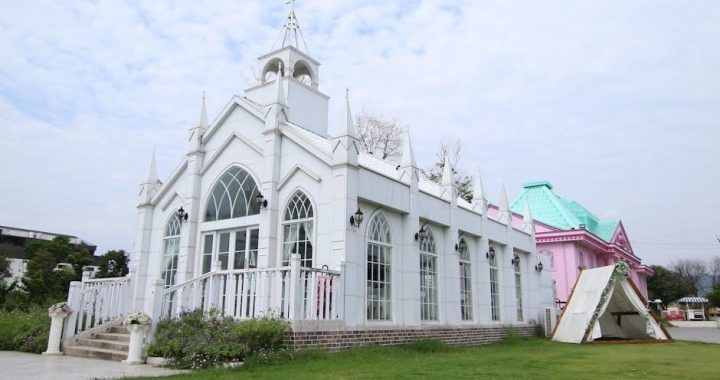Janazah Prayer is a collective duty for Muslims, performed for the deceased to seek Allah’s mercy. It involves specific supplications and four Takbeers, emphasizing community support and spiritual reflection.
Overview of Janazah Prayer
Janazah Prayer, or Salat al-Janazah, is a collective duty in Islam performed for the deceased to seek Allah’s mercy and forgiveness. It is a solemn ritual conducted before burial, emphasizing the importance of supplication and remembrance of Allah. The prayer consists of four Takbeers, each followed by specific supplications, including prayers for the deceased, the living, and the Prophet Muhammad (peace be upon him). This prayer is a demonstration of community support and spiritual solidarity. It is considered Fard Kifayah, meaning it becomes obligatory if a sufficient number of people are present. The prayer structure includes reciting the Fatiha, additional supplications, and ending with the final salutation. Janazah Prayer is a vital Islamic practice that highlights the importance of seeking divine mercy for the departed soul.
Importance of Dua in Janazah Prayer
Dua in Janazah Prayer holds profound significance as a means of seeking Allah’s mercy and forgiveness for the deceased. It serves as a spiritual intervention, imploring Allah to grant the departed soul peace, forgiveness, and a lofty rank in the Hereafter. The supplications made during the prayer are not only for the benefit of the deceased but also for the living, fostering a sense of humility and reflection. The Dua after each Takbeer is specifically designed to address different aspects, such as mercy, forgiveness, and a righteous return to Allah. This practice underscores the Islamic emphasis on communal supplication and the belief in Allah’s boundless mercy. Through these supplications, the Muslim community collectively seeks divine grace for the deceased and themselves, reinforcing the bond of faith and solidarity.

The Structure of Janazah Prayer
Janazah Prayer consists of four Takbeers, with specific supplications after each, forming a structured framework for collectively seeking mercy and forgiveness for the deceased and the living.
The Four Takbeers in Janazah Prayer
The Janazah Prayer is characterized by four distinct Takbeers, each serving a specific purpose. The first Takbeer initiates the prayer, followed by the recitation of Surah Al-Fatihah and a supplication for the Prophet Muhammad (peace be upon him). The second Takbeer precedes a heartfelt supplication for the deceased, seeking Allah’s forgiveness and mercy. The third Takbeer is followed by another supplication, often including blessings for the deceased and the Muslim community. Finally, the fourth Takbeer concludes the prayer, ending with a final salutation to the right. Each Takbeer is a pivotal moment, guiding the congregation through a structured and meaningful supplication for the deceased and the living alike.
The Order of Dua and Dhikr
The Janazah Prayer follows a specific sequence of supplications and remembrances, ensuring a structured and meaningful worship. After the first Takbeer, the Imam recites Surah Al-Fatihah and a prayer for the Prophet Muhammad (peace be upon him). Following the second Takbeer, a heartfelt supplication is made for the deceased, seeking Allah’s forgiveness and mercy. The third Takbeer is accompanied by a prayer that includes blessings for the deceased and the broader Muslim community. Finally, after the fourth Takbeer, the prayer concludes with a final salutation to the right. This orderly sequence ensures that the congregation’s supplications are comprehensive and aligned with Islamic teachings, emphasizing the importance of unity and collective worship.
Essential Duas and Supplications
Essential Duas in Janazah Prayer are vital supplications seeking Allah’s mercy for the deceased and the living. They are structured to ensure a sincere and meaningful worship experience.
Dua After the First Takbeer
The Dua after the first Takbeer in Janazah Prayer is a heartfelt supplication seeking Allah’s mercy and forgiveness for the deceased. It begins with praising Allah, followed by sending blessings upon Prophet Muhammad (peace be upon him), and concludes with a plea for forgiveness for the deceased and all believers. This Dua is a perfect formula of supplication, ensuring a balance between praise and prayer. It is recited collectively by the congregation, offering comfort to the family of the deceased and seeking Allah’s compassion. This supplication reflects the Islamic emphasis on seeking divine mercy and highlights the importance of unity in worship. It is a beautiful Sunnah that reminds believers of Allah’s mercy and the Prophet’s teachings on supplication.
Dua After the Second Takbeer
The Dua after the second Takbeer in Janazah Prayer focuses on seeking forgiveness for the deceased. It is a solemn supplication where believers ask Allah to pardon the deceased and grant them mercy. This Dua emphasizes the importance of intercession and highlights the community’s role in supporting the deceased spiritually. It is recited with humility and sincerity, reflecting the Islamic value of seeking divine forgiveness. The supplication also extends to include all believers, demonstrating the unity of the Muslim community in seeking Allah’s compassion. This Dua serves as a reminder of the finality of life and the eternal nature of divine mercy.
Dua After the Third Takbeer
The Dua after the third Takbeer in Janazah Prayer is a heartfelt supplication for the deceased, seeking Allah’s forgiveness and mercy. It emphasizes the believer’s acknowledgment of Allah’s sovereignty and the inevitability of death. This Dua is a plea for the deceased to be granted a noble station in the afterlife and for their sins to be forgiven. It also serves as a reminder to the living of the transitory nature of life and the importance of preparing for the hereafter. The supplication is recited with profound sincerity and hope, reflecting the Islamic belief in divine mercy and justice. It is a moment of deep spiritual reflection and connection with Allah.
Dua After the Fourth Takbeer
After the fourth Takbeer, the Dua is a comprehensive supplication that concludes the Janazah Prayer. It includes the recitation of specific prayers, such as the Salah (praising the Prophet Muhammad, peace be upon him) and the Durood. This Dua is a final appeal to Allah for His mercy and blessings upon the deceased, the living, and the entire Muslim community. It is a moment of profound connection with Allah, emphasizing gratitude and humility. The prayer ends with the congregation turning their heads to the right and offering the Salam, marking the conclusion of the Janazah Prayer. This Dua serves as a poignant reminder of the ultimate goal of seeking Allah’s forgiveness and eternal peace for all believers.

Benefits of Performing Janazah Prayer
Performing Janazah Prayer strengthens faith, fosters unity among Muslims, and provides spiritual comfort to the deceased’s family. It also earns the performer blessings and rewards from Allah.
Spiritual Benefits for the Living
Engaging in Janazah Prayer offers profound spiritual benefits for the living. It serves as a poignant reminder of life’s transient nature, encouraging mindfulness of one’s own mortality and the Hereafter. Participating in this collective duty fosters a sense of communal responsibility and unity among believers. The act of supplicating for the deceased and seeking Allah’s forgiveness strengthens one’s connection with the Divine. Additionally, it cultivates empathy and compassion, as individuals pray for the deceased’s forgiveness and mercy. This practice also provides an opportunity for self-reflection, urging the living to assess their deeds and strive for righteousness. Ultimately, it reinforces faith and prepares the heart for the inevitable journey to the afterlife.
Benefits for the Deceased
The Janazah Prayer brings significant spiritual benefits for the deceased. The collective supplications and prayers of the congregation are believed to ease the deceased’s journey into the afterlife. The Dua made after each Takbeer seeks Allah’s mercy and forgiveness for the deceased, helping to lighten their burdens. Additionally, the prayer is considered a source of comfort and spiritual support, as the living intercede for the deceased. The act of praying together also strengthens the bond between the living and the deceased, emphasizing the Islamic value of caring for one another even after death. These supplications are rooted in Islamic teachings and are a means of seeking Allah’s grace for the departed soul.

Role of the Imam and Congregation
The Imam leads the Janazah Prayer, ensuring correct procedure and unity. The congregation follows, maintaining focus and performing the prayer collectively, fulfilling a shared religious duty.
Responsibilities of the Imam
The Imam plays a central role in leading the Janazah Prayer, ensuring it is performed correctly and in unison with the congregation. They are responsible for reciting the four Takbeers, the Fatiha, and the designated supplications. The Imam must maintain the correct order of the prayer, guiding the congregation through each step. They also ensure that the prayer is conducted with the proper etiquette and focus, avoiding distractions. The Imam’s leadership helps the congregation stay united and attentive, fulfilling the spiritual obligations of the prayer. Their role is crucial in maintaining the integrity and collective worship of the Janazah Prayer, making them a focal point for guidance and unity.
Etiquette for the Congregation
The congregation must maintain proper etiquette during the Janazah Prayer, ensuring respect and focus. They should stand in straight lines, avoiding gaps, and remain silent after each Takbeer. It is essential to follow the Imam’s lead, synchronizing actions like raising hands and making supplications. Modest attire and cleanliness are obligatory. The congregation should avoid unnecessary movements or conversations, keeping their attention on the prayer. Unity and collective intention are vital, as the prayer is a communal act of seeking mercy for the deceased. Congregants should also reflect on their own mortality, using the moment for personal reflection and supplication. Their role is to support the Imam and the deceased, ensuring the prayer is performed with dignity and sincerity.

Common Mistakes and Corrections
Common mistakes in Janazah prayer include incorrect recitation of supplications, improper formation, and not following the Imam. Corrections involve proper education, clear leadership, and maintaining discipline within the congregation to ensure unity and focus.
Understanding the Correct Method
Understanding the correct method of performing Janazah prayer is essential to ensure its validity and spiritual efficacy. It begins with proper formation, where the congregation aligns in straight rows behind the Imam. The recitation of specific supplications and the correct order of the four Takbeers must be observed. Many mistakes arise from incorrect recitation or misalignment, which can be corrected through proper education and guidance. Followers should strictly adhere to the Imam’s lead, avoiding individual deviations. The prayer’s integrity lies in unity and precision, reflecting the community’s collective supplication for the deceased. Proper training and awareness of the Sunnah practices are vital to maintain the prayer’s sanctity and effectiveness.
Avoiding Innovations in the Prayer
Avoiding innovations in Janazah prayer is crucial to preserving its authenticity and spiritual value. Many deviations occur due to cultural practices or personal preferences, which are not rooted in Islamic teachings. For instance, adding extra supplications or altering the order of the du’as can be considered innovations. The Sunnah emphasizes adhering strictly to the prescribed method, ensuring that the prayer remains a collective act of worship free from personal additions. It is essential to educate oneself through reliable sources and scholarly guidance to maintain the prayer’s purity. Avoiding such innovations ensures that the Janazah prayer is performed in accordance with the Prophet’s teachings, preserving its sacredness and communal unity.
The Janazah prayer is a vital act of worship that reflects the Muslim community’s collective responsibility to honor the deceased and seek divine mercy. By adhering to the Sunnah and avoiding innovations, the prayer maintains its authenticity and spiritual significance. The specific du’as and supplications within the prayer highlight the importance of seeking Allah’s forgiveness and guidance. Performing Janazah prayer not only benefits the deceased but also fosters unity and reflection among the living. It serves as a poignant reminder of life’s transient nature and the ultimate return to Allah. May this prayer continue to be a source of comfort and spiritual strength for all who participate in it, upholding the teachings of Islam with sincerity and devotion.
